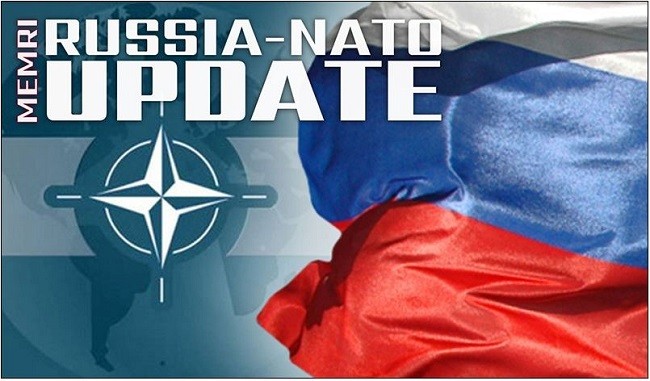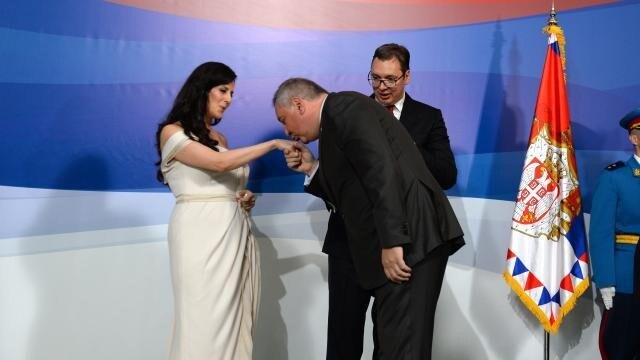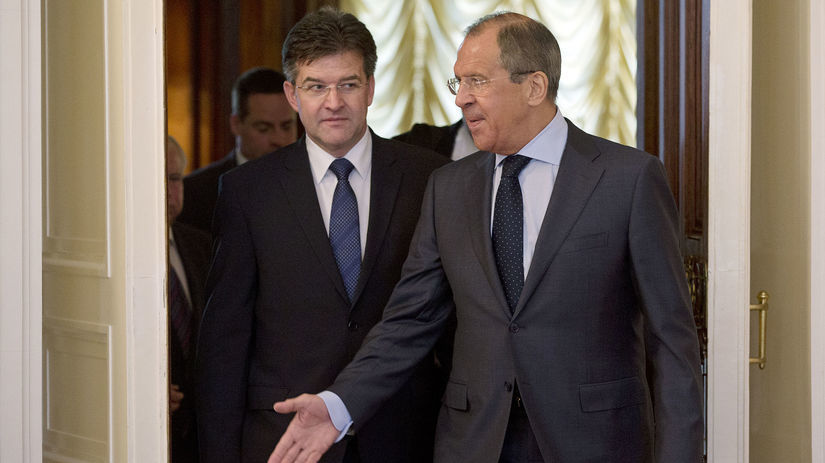Russia-NATO Update is a new monthly review by the MEMRI Russian Media Studies Project, covering the latest news on Russia-NATO relations from the Russian and East European media. This update deals with Russia's reactions to Montenegro's accession to NATO and Russia-Balkans relations.

Russia's Deputy PM Rogozin Visit To Serbia: 'I Believe That Montenegro Is For Serbia What Ukraine Is For Russia'
On June 5, 2017, Montenegro became the 29th member of NATO. On June 25, during a visit to Serbia to attend attending Aleksandar Vucic's presidential inauguration in Belgrade, Russian Prime Minister Dmitry Rogozin commented: "I believe, that Montenegro for Serbia is like Ukraine for Russia. In fact, this was created [i.e. Montenegro's accession to NATO] not against Russia, but against Serbia as a counter weight: this counter weight consists of brothers and sisters. We know full well who the Montenegrins are – everything is mixed there. This proves that it's possible to 'plant' something into your brother in order to turn him into someone more alien than a stranger".
(Ria.ru, June 25, 2017)
Rogozin commented also on Serbia's bid to join the EU that he believes is destined to fail. Rogozin said: "First of all, how could they accept you to where others are fleeing from. They have a scandal over there. The Brits are leaving, while they're convincing you to go to the EU. They don't like it, but they want you to like it. That's not done. Something's wrong there. As they say, 'God gave you what I don't want for myself'." Rogozin then added:
"When it comes to conditions for Serbia's accession to the EU, you will have to renounce Kosovo. You will never do that. Not the most pro-Western Serb will ever betray their fatherland. One can discuss the economy, the exchange rate, taxes, but that (Kosovo) is a question of treason. And without renouncing Kosovo, the Serbs will not be admitted to the EU."
(B92.net, June 26, 2017)
Rogozin then added: "Serbia will join the EU just like Turkey did. Or … they would break you into pieces, and then accept you part by part. The moment they grant you a membership, they will lose any interest of you. They say that there is this game played between the EU and Russia – which one can appeal to Serbia more. But, in fact, there's no game. There is no result, because Russia and Serbia will always be together." Rogozin noted that Serbia could have good relations with the EU without becoming a member.
Commenting on when Russian MiG fighter jets would be transferred to Serbia, Rogozin said: "The president [Vladimir Putin] will inform you of this. I would love to tell you, but we have agreed that he will be the one to tell you. It's not just about MiGs, it's a lot of stuff – tanks, transport planes… It is a serious and big assistance… The Serbs will get everything, including the S-400 missile system, if that is required."
(Serbianmonitor.com, June 26, 2017)

Rogozin kissing the hand of Tamara Vucic, wife of Serbian President Aleksander Vucic. (Source: B92.net, June 26, 2017)
Commenting of Rogozin's words, Montenegrin defense minister Predrag Boskovic said that Russia's deputy prime minister was sending a message "more to Serbia, than to Montenegro." Boskovic then said that he can"neither justify nor understand" Rogozin's statement, adding that Montenegro's membership in NATO was "in Russia's best interest, if Russia's interest is peace and stability in the Balkans." Boskovic also explained that it is also "in Serbia's interest to be a part of NATO" - adding that "the path toward the EU is significantly facilitated by previous NATO membership."
(B92.net, July 3, 2017)
Pravda: Russia Loses The Balkans To Its Own Advantage
The Russian media outlet Pravda, published an article, titled "Russia Losses The Balkans To Its Own Advantage," analyzing Russia's policy in the Balkans. According to the article's author, Russian journalist Dmitry Nersesov, Russia is abandoning the Balkans, because Moscow cannot afford to fight on too many fronts against the West. Nersesov wrote that Russia already has complicated relations with the West in Ukraine and Syria, therefore "the idea of getting involved in Balkan problems would be unnecessary and harmful."
SUPPORT OUR WORK

Below are excerpts from Nersesov's article:

Dmitry Nersesov (Source: Pravda.ru)
"After Montenegro's accession to NATO and the presidential election in Serbia, many Russian observers noted that Russia was losing the Balkans. We are not going to argue whether Russia is losing or has already lost the Balkans. Yet, we will try to find out in this article whether Russia needs the Balkans.
"Critics of Moscow's policy in the Balkans point out two aspects. First of all, the Kremlin has refused to make serious attempts to place obstacles before Montenegro's NATO membership. [1]Secondly, Moscow made no effort to ensure the victory of a pro-Russian candidate during the presidential election in Serbia. To crown it all, the critics accuse Russia of inaction in Greece, Macedonia and Bulgaria.
"Strictly speaking, Moscow does show little interest in the Balkans. Protests about Montenegro's entry into the North Atlantic Alliance were sluggish and formal. Russian officials expressed their feeble protest on the subject after Montenegro joined NATO, even though the West accused Russia of plotting a coup in the former Yugoslav republic.[2]
"In Serbia, the election of President Vucic, who does not hide his pro-Western stance, did not become a reason for much concerns in the Kremlin either. The head of the Serbian government today is a lady, who enjoys the reputation of a U.S. agent. The new Serbian president also set up a department for European integration. Yet, Russia did not make any big story out of it.
"Bulgaria's new president is a politician who declared a course towards the Russian Federation. However, his coming to power did not serve as a signal for Moscow to go on a strategic offensive.
"Greek Prime Minister Tsipras went to Putin in the hope that Moscow would protect Athens from the financial aggression of Germany, but left with nothing.
"The events in Macedonia, where Albanian parties pushed Slavic, Moscow-oriented forces, away from power, did not produce much of an impression on Moscow either.
"These are the facts. They testify to the hypothesis about Russia's strategic retreat from the Balkan region.
"Is there an alternative?
"An alternative to Russia's current sluggish policy in the Balkans could be Russia's participation in an endless, exhausting, unpromising confrontation with the West in a region where the state of affairs has always been extremely confusing, where everyone is at odds against everyone, and where interests of many external players intersect. Of course, memories of the operation that Russian peacekeepers conducted in Pristina in the summer of 1999 are still dear to Russia, but it would be silly to stage another operation like that, albeit on the scale of the whole region.
"The Balkans are dubbed as the powder keg of Europe. The complex history of the region has created a political term - 'Balkanization,' which designates the collapse of a complex ethno-religious and ethno-political mosaic against the backdrop of a multitude of internecine conflicts. The Balkans are going through the process of balkanization themselves, and dealing with this region is highly dangerous and costly.
"Does Russia have resources to do this? The answer is no. Russia already has Ukraine and Syria, complicated relations with the West in general. Therefore, the idea of getting involved in Balkan problems would be unnecessary and harmful.
"The position of an external observer seems to be a lot more reasonable. Let the EU, the U.S., the Islamic world try to decide the fate of the Balkans - all those who want to catch a piece of influence in the powder cellar of Europe.
"Within the EU, there are several centers of power that have historically been attracted to the Balkans. First of all, it concerns Austria and Germany. Whatever they may say about European solidarity and the omnipotence of Berlin, Vienna sees the Balkans as its backyard that used to be a part of Austria's territory some 100 years ago. One may assume that Austrian politicians are likely to be attracted to the idea of returning the country's supremacy over a part of the region. Slovenia, for example, could ensure Austria with a gateway to the sea. Interestingly, The Hague Court has recently made a curious decision about the Piran Bay: a part of sea area was cut off from Montenegro (a newly made NATO member) to give this area to Slovenia.
"For Germany, control over all the Balkans is an indispensable condition for an effective policy to 'discipline' Europe. Suffice it to recall the fact that Hitler delayed the attack on the USSR to achieve 'tranquility' in Yugoslavia. Germany needs to take the region under total control, otherwise, the game of the German Fourth Reich looks unconvincing.
"Another historical contender for domination in the Balkans is Turkey. There is no doubt that Erdogan intends to restore positions of the Ottoman Empire step by step.
"In a nutshell, the Balkan region is a hornet's nest, for which several greedy animals are struggling. Anglo-Saxons will try to take advantage of the situation in the Balkans. Britain and the United States will use the situation to manipulate the struggle between the Germans, the Austrians and the Turks for the Balkans. They do not want peace in the region; Washington and London will make every effort to ensure the 'Balkanization' of Europe continues as a neglected crisis is required."
(Pravdareport.com, July 4, 2017)
APPENDIX I – Lavrov: 'Our Western Colleagues… Are Obsessed With Getting The Balkans On Their Side' – Mid.ru, June 6, 2017.
During a press conference in Kaliningrad with Minister of Foreign and European Affairs of the Slovak Republic Miroslav Lajcak, Russian Foreign Minister Sergey Lavrov answered a question about Montenegro's NATO membership.

Sergey Lavrov with Miroslav Lajcak (Source:Spravu.pravda.sk)
Q: "Montenegro joined NATO on Monday, becoming the latest European member of the Alliance. Does this enlargement concern Moscow, especially given the fact that military exercises with a focus on rebuffing Russian aggression are being conducted throughout Europe?"
Sergey Lavrov: "We have already covered Montenegro being dragged into NATO. Our Western colleagues, primarily the United States and the leading EU countries, are obsessed with getting the Balkans on their side. The EU has plans in this regard. Talks are underway with Serbia, including Kosovo, as well as Macedonia and Montenegro. We do not and cannot have anything against these countries becoming part of European economic integration. This is a natural process since they form a single geographic and economic mechanism, a market, and a common economic space. We are all for it and hope that one day this economic space will include the rest of the Eurasian continent in accordance with the concept of the common economic space.
"With regard to NATO, this organization has lost the original justification for its existence after the socialist system, the Warsaw Pact, and the Soviet Union disappeared. However, the search for reasons that could justify its existence never stopped. The developments in Afghanistan came in handy. NATO went there on a mission bringing along tens, even hundreds of thousands of armed people, but, unfortunately, it didn't help either to reduce the threat of terrorism or to weaken the drug trade. On the contrary, these threats escalated considerably, and it became clear that there was nothing more they could do there, because there was no way to earn any points there. Then the situation in Ukraine came along, which you are all aware of: a coup in violation of the agreement signed by the leading countries of Europe, and dumping all of it on Russia. Since then, Ukraine has been run by people who, in fact, are completely controlled by the ultra-radical elements who masterminded that coup. This came as another pretext to re-consolidate NATO, to invoke the Russian threat, and to proceed, on an unprecedented scale, to increase the military and military-technical presence of the North Atlantic Alliance at our borders. Eventually, this led to the need for them to create an image of the enemy in order to implement these plans. The activities of the Russia-NATO Council were frozen. "Dialogue came to a standstill. Instead, there were demands, ultimatums, and groundless accusations. As part of this campaign, persistent appeals, exhortations, and demands to join the anti-Russian campaign were addressed to all the countries of the Balkan Peninsula, which have so far managed to retain their sovereignty. Some countries, such as Serbia and Macedonia, refused to do so. This hurt the NATO leaders' feelings, and they will probably try to hit these countries back for their independent position. In Montenegro, these demands fell on fertile soil, not least because the Montenegrin leadership received a promise that their 'run-ins' with the law would be forgotten if they join NATO.
"This is a purely geopolitical project which clearly doesn't strengthen NATO security. It may lead to additional spending by NATO countries, since it will be necessary to develop the territory of Montenegro in the military-technical sense. It will not improve that country's security by one iota, either, because Montenegro is not threatened and is unlikely to be ever threatened by anyone. The hysterical Russophobic voices, which come from Podgorica from time to time, can only elicit regret and, in the grand scheme, a smile.
"NATO membership was imposed on Montenegro in exchange for its loyalty to the anti-Russian sanctions and politics. There is nothing more to say on this account. I believe that this trend will bring us back to the policy of dividing lines in Europe. It undermines numerous big promises by Western leaders about the need to ensure equal and indivisible security and, in fact, is a dead-end policy that does not bode well for anyone.
"We are open to dialogue. We understand that despite all that we have to say about it, NATO is a reality, and we are willing to talk, but to do so on an equal basis and rely on concrete facts, comparing our respective capabilities and military activity. If we sit down and do an honest fact-check, everyone will see that NATO members are much more active in their military preparations, and they spend many times more money on them than Russia."
(Mid.ru, June 6, 2017)
[1] See MEMRI Special Dispatch No.6443, Russian Reactions To Negotiations On Montenegro's NATO Membership, May 20, 2016.
[2] See MEMRI Special Dispatch No. 6693, Russia's Orbit - Part II - The Attempted Coup In Montenegro, November 24, 2016.




